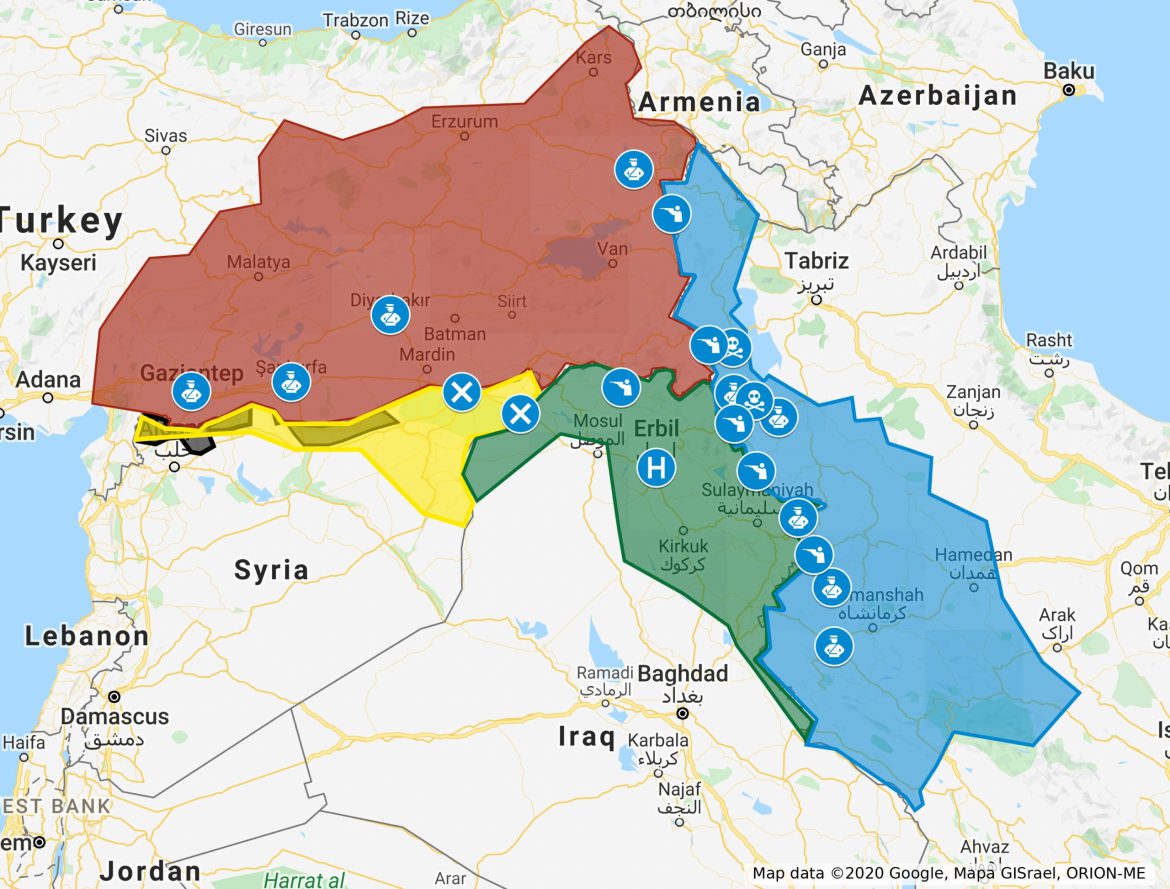1.5K
Iran
- The Iranian regime executed two Kurdish political prisoners, Sabir Sheik Abdullah and Diako Rasolzada, on July 14. Abdullah and Rasolzada were charged with “membership of Kurdish opposition parties” in 2010 and were also accused of bombing a military parade in Mehabad. The Iranian regime has now executed approximately 15 Kurdish political prisoners since March 2020.
- Iranian authorities arrested six Kurds for political activism last week. Iranian security forces arrested a Kurdish environmental activist named Fateh Mohammadi in Javanrud (Jwanru). Additionally, Iranian intelligence officers (Ettela’at) arrested three Kurdish men identified as Abu Baker Abdi, Pahrouz Bayzidi, and Kewan Shwani in Oshnavieh and held them without charge. Ettela’at also arrested a Kurdish man named Reza Ramazani for “insulting Iran’s sacred figures” in Kermanshah Province’s Eslamabad-e-Gharb city. Finally, Iranian authorities arrested a 16-year-old named Matin Khola in Mehabad.
- A Kurdish political prisoner from Piranshahr named Abdulwahed Ara committed suicide in Naqadeh on Saturday. Ara was sentenced to 11 years in prison for “membership of an opposition Kurdish party.” Before his suicide, Ara, like other political prisoners, was denied the temporary release that the Iranian regime has granted some prisoners to mitigate the coronavirus pandemic.
- Iranian and Turkish security forces killed three Kurdish border porters (Kolbars) last week. Last Tuesday, Islamic Republic of Iran Army (Artesh) personnel shot and killed a shepherd named Yousif Ahmadi near Sardasht in an act the Kurdish Human Rights Association (KMMK) claimed was perpetrated without cause or warning. Likewise, Iranian authorities ambushed a group of Kolbars near Kermanshah Province’s Nowdeshah District and killed a Kolbar named Ayat Yousifi. Concurrently, Iranian border guards wounded three Kolbars near Urmia. Iranian border guards also killed a Kolbar named Ibrahim Abubaker near Piranshahr and shot a number of horses and mules used by Kolbars to transport cargo in the Hawraman region. Meanwhile, Turkish border guards attacked a group of Kolbars and killed a man named Ziad Asbati near the Chaldiran District. The Iranian regime has now killed 37 Kolbars and wounded at least 99 in 2020.
Iraq
- Amid Turkey’s continuing incursion into Iraqi Kurdistan, the Turkish Directorate of Communications released a map showing nearly 40 military bases inside Iraqi Kurdistan. Simultaneously, Turkey deployed additional troops to locations near Zakho, and Turkish air and artillery strikes hit several areas, including the Kani Massi village in Duhok Governorate’s Amedia District. Meanwhile, though Turkey again claimed to be targeting Kurdistan Workers’ Party militants, the head of the Batifa District told Rudaw that 30 civilians have been killed by the most recent attacks so far. Turkey’s continuing military operations have also displaced thousands of civilians since they began in May 2019.
- Iraqi Kurdistan’s coronavirus numbers continue to surge, as at least 1,500 new cases were confirmed last week. At the same time, the region’s death count hit 340 last week, and its total numbers now stand at 9,695 confirmed cases, 4,031 active cases, and 5,324 recoveries. Kirkuk remains one of the region’s hardest-hit areas, and its numbers now stand at 2,247 confirmed cases and 114 deaths, including the city’s Kurdish police spokesperson Colonel Afrasiao Kamil who died on Saturday. Meanwhile, both Iraqi and Kurdish authorities continue to restrict travel between provinces, and Iraq has now confirmed more than 77,000 cases and at least 3,000 deaths.
- Nearly 2,000 Sufi dervishes of the Qadiri order illegally entered Iraqi Kurdistan through the Bashmakh border crossing to attend the funeral of Sheikh Mohammed al Kasnazani. Though the Iranian authorities opened fire on the dervishes, who lacked passports, and injured five of them, the rest managed to successfully cross the border into Iraq where they boarded buses, traveled to Sulaymaniyah, and attended al Kasnazani’s funeral on Friday.
Syria
- Russia continued efforts to bring the Kurdish-led Autonomous Administration of North and East Syria (AANES) back under the control of the Assad regime. Following the most recent Turkish attacks in northeastern Syria, Ministry of Foreign Affairs of the Russian Federation spokesperson Maria Zakharova welcomed talks between the Assad regime and Syrian Kurds in saying, “Based on this principled stance, Moscow supports dialogue between the Kurds and Damascus on the future governance of their shared homeland.” Russia previously called the US presence in Syria “illegal” and wants to dissolve the US-backed Syrian Democratic Forces (SDF) into a new Syrian Arab Army division called “Division 5.” On another note, United States Central Command (CENTCOM) Commander General Kenneth McKenzie visited Syria on Friday, met with SDF General Commander Mazloum Abadi, and discussed continuing operations against the Islamic State (Da’esh) and efforts to forge a peace agreement in the region.
- The UN Security Council finally passed a resolution extending the authorization of cross-border delivery of humanitarian aid into Syria for one year. Though the resolution initially suggested the use of four border crossings, including the al Yarubia crossing between Iraq and the AANES, Russia and China vetoed that proposal and the only entry point that was authorized was the Bab al Hawa crossing on the Syrian-Turkish border. Russia, which supports the Assad regime, has consistently opposed the opening of additional entry points into Syria for humanitarian aid deliveries.
Turkey
- Turkish police arrested dozens of Kurds, mostly members of the pro-Kurdish Peoples’ Democratic Party (HDP), in several cities last week. On Wednesday, Turkish authorities detained five Kurds in Izmir. Turkish police also arrested three people, including at least one senior HDP member, in Urfa. Simultaneously, Turkish authorities arrested Betül Yaşar, the Kurdish co-mayor of Agri Province’s Diyadin District. Likewise, Turkish police arrested 33 people, including the local HDP heads, in Gaziantep. A number of female Kurdish activists were also detained in Diyarbakir (Amed). Nearly all of those arrested were accused of “membership of a terrorist organization” and “propaganda for a terrorist organization,” charges which have been consistently used to justify crackdowns on Kurdish politicians and activists.

